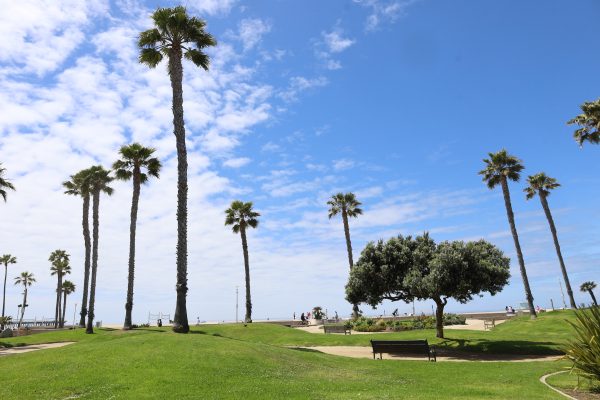
The group’s mission statement is concise and to the point: To educate, impact, and involve at-risk youth with music therapy.
In 1986, Howie Rich and his rock ‘n’ roll and blues band, Saturday Night Bath, took part in a Dodger Day event at Los Padrinos Juvenile Hall in Downey. Rich recalls that, other than ballplayers like Mike Scioscia and Ken Landreaux, there were low-rider cars, a motorcycle club, and his music-making ensemble.
These days, Rich says, “we’re playing mostly for continuation school kids, the kids that are on the fence” – meaning that these youngsters could swing either way, into an honest life or into the arms of crime.
It was L.A. Mayor Tom Bradley who suggested to Rich that Saturday Night Bath focus on continuation or second-chance high schools. “At the time we were playing a lot of juvenile halls,” Rich says, “and the juvenile halls are like the bottom rung where most of the heavy-duty felons are.”
Did you know what you were getting into, 26 years ago, when you began doing this?
“No, I just kind of did it as I went,” Rich says. “But along the way you realize that you’re playing for the underbelly, for the people that are literally forgotten. And half of the time people say, Oh, those kids don’t deserve music, they’re troublemakers.” He pauses. “You know, a lot of them are just in there for smoking pot; and they’re in the system and then it snowballs into worse things in their lives.”

The band
Howie Rich likens Saturday Night Bath to the old Paul Butterfield Blues Band. He himself plays bass, standup and electric, and then he’s got Jo Alice Braswell on harmonicas and keyboard, Keith Scripps on congas, Ziggy on guitar, Marcus Brox on drums, Dave V. Holland on flute and baritone sax, and Mike Tulin on bass guitar.
“When we started out,” Rich explains, “I had two guitarists; now we have two bass players, kind of like the old James Brown band in the ‘70s. And I love that, that’s so much fun – two bass players.”
One might imagine that an outfit like this relies solely on cover tunes, and while they do perform rhythm ‘n’ blues classics from the 1960s, Rich says he encourages his musicians to bring in their own original tunes.
Asked if he also composes, Rich doesn’t lose a second:
“Yeah. I’ve written 114.”
That’s as precise as they come, and I almost think he’d be able to reel off the titles of each one if I asked him.
As for the lineup, Rich says it doesn’t really change.
“They stick around. I always tell them that if they don’t have fun then I don’t get paid, so that’s my motto.”
From Brooklyn to L.A.
Among his many early accomplishments, Rich taught Neil Sedaka to throw a Frisbee. That was in New York, back in the 1960s, and if you don’t remember the’60s then you probably don’t remember Neil Sedaka, either, although your parents may recall “Calendar Girl” and “Breaking Up Is Hard To Do.”
“I started on guitar at nine-years-old,” Rich says. “My mom gave me guitar lessons. But when I got to junior high they wouldn’t allow kids to play guitar because everybody would [want to] play one. So I went to trumpet and I played trumpet in the marching band in high school and froze my butt off.”
However, the music department had instruments and that’s when Rich picked up the bass. When he was 16 he formed a little jazz combo, and they played, in New York, for several years. In 1971 he graduated with a B.A. in Economics from Queens College of the City University of New York. Two years later, he grins, “I moved out here, looking for blonde women and the music industry.”
At that time, what were you playing?
“I was pretty much a rock ‘n’ roller,” he replies, which isn’t to say he only played in rock ‘n’ roll bands. He spent a couple of years with the Marina del Rey-Westchester Symphony, and he played eclectic music with The Armenian Pops, under the auspices of Ed Hosharian.
“I had a good feel for rhythm, and rhythm ‘n’ blues, so I was able to fit in with that circle and play 9/8 time, stuff like that. But my love was essentially rock ‘n’ roll and blues. Probably still is.”
However, Rich remains a closet classical music fan: “I love Vivaldi and harpsichord,” he admits. “Most people don’t know that about me.”
Keeping it pumped up
In a good month, Saturday Night Bath plays once a week, but the good months aren’t as common as they were. That’s because school funding for these events has dwindled since the 1990s, although L.A. County Supervisors like Mike Antonovich, Zev Yaroslavsky, and Don Knabe have in the past or present given him a check. The band also continues to get money by way of the L.A. County Arts Commission and the City of L.A.’s Department of Cultural Affairs. After Saturday Night Bath became a non-profit group, they were able to secure various grants.
Naturally one may be curious as to what the kids themselves get out of all this. After all, none of the musicians who’ve come to play are in the first bloom of youth, and Rich himself is now 64. “But then we play rock ‘n’ roll,” he says, “and it’s instantaneous; fast and loud.” Add a few solos and lots of improvisation, “and the kids notice all of that. They may not act or look like they do, but they hear it all.”
Rich points out that the band’s interaction with the kids begins right away – they can help bring in equipment and set it up. But even before the group’s arrival they were prompted, and urged, to bring a guitar or other instrument to the concert so they could participate. Same thing if they have a song they want to sing onstage.
“Once they join us,” Rich says, “they’re an instant celebrity [among their peers]. Instead of something bad, it’s something cool that they did. And we encourage them: You’ll be sorry if you’re not brave now and don’t come up; when we’re gone you’ll wish you did.”
After a couple of songs the band pauses and gives musical insight – the thirteen names of the bass fiddle, says Rich, by way of an example. “If they remember ten things that we’ve talked about we give them a harmonica” – donated by Hohner, so you know they’re good. “And then, when we play for the pregnant schools, Jo [Braswell] brings in little stuffed animals for the moms-to-be. So, they’re included; they can come up and perform.”
Afterwards the kids are invited over to talk with the group, and they can even get a quick music lesson.
“What you’re saying,” adds Mike Schweid, “is that the audience gets inspiration from your being there and showing them that they can do something that they [couldn’t] do before.”
“Absolutely,” Rich says.
Schweid used to manage Wallach’s Music City – all half-dozen of them. Forty years ago, he gave Howie Rich his first job after he landed on the West Coast. They’ve remained friends to this day.
Schweid, who works as a mediator between disgruntled parties, also enlisted members of Saturday Night Bath to perform at the yearly candlelight vigil for victims of domestic violence, held each fall – Oct. 16 at 6:30 p.m. is the next one – at the Redondo Beach Police Station at City Hall. It’s organized by Mrs. Erica, and it brings attention to the plight of women – and some men – who have been mired in abusive relationships.
Battered or bruised in the past, these people share their experiences with one another and those who come to hear them. They seem to be the fortunate ones, who have been able to take themselves – and their children, if they have any – out of a hostile environment and to begin anew. It is hoped that this will inspire others, who haven’t known where to turn, to seek help as well.
For Howie Rich, this is another aspect of what he’s been drawn to, for well over a quarter of a century.
“This is our third year,” he says, as he looks forward to the October event. “We’re proud to be a part of it.”
Saturday Night Bath’s next concert and clinic takes place at 11 a.m. on Friday, Sept. 7, at Moneta High, 1230 W. 177th St., in Gardena. To contact Saturday Night Bath call (310) 542-1239 or email info@saturdaynightbath.org. Or visit the website at saturdaynightbath.org.











